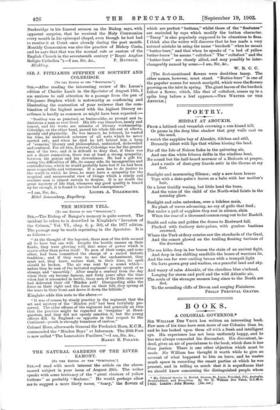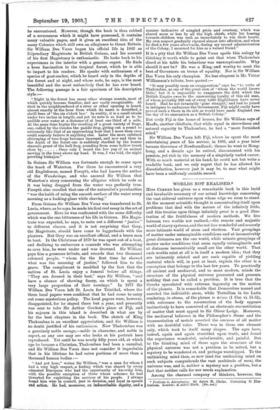BOOKS.
A COLONIAL GOVERNOR.*
SIR WILLIAM DES VCEDX has written an interesting book. Few men of his time have seen more of our Colonies than. he, and he has looked upon them all with a fresh and intelligent eye. His experience has not been uniformly happy, and he has not always concealed his discomfort. His discontent, in- deed, gives an air of peevishness to the book, which does it less than justice. There is one other objection which must be made. Sir William has thought it worth while to give an account of what happened to him on leave, and he wastes much space in recording the smart parties at which he was present, and in telling us much that it is superfluous that we should know concerning the distinguished people whom • My Colonial Service in British Guiana, St. Lucia, Trinidad, Fiji, Australia, Newfoundland, and Hong-kong. By Sir G. William Des VORIX, G.0ALG. 2 vols. Landon : John Murray. P.44 net.)
be encountered. However, though the book is thus robbed of a seriousness which it might have possessed, it contains many valuable pages, and it gives an excellent idea of the many Colonies which still own an allegiance to Great Britain. Sir William Des Vceux began his official life in 1863 as Stipendiary Magistrate in British Guiana, and his account of his first Magistracy is enthusiastic. He looks back to his experiences in the interior with a genuine regret. He finds a keen fascination in the tropical forest, which he is able to impart to his readers. He speaks' with enthusiasm of a species of goat-sucker, which he heard only in the depths of the forest and at night, and whose note, he says, is the most beautiful and the most melancholy that he has ever heard. The following passage is a fair specimen of his descriptive style :—
" Night in the forest has many other strange sounds, most of which quickly become familiar, and are easily recognisable. At dusk in the neighbourhood of a river or other opening is heard, almost exactly at the hour from which its name is described, a shrill burr of 'the six o'clock bee.' In reality, it is a small cicada under two inches in length, and yet its note is so loud as to be audible over water at a distance of at least one third of a mile. At the same time begins the croaking of a great variety of frogs, one, called by the Creoles the paddle frog, giving out a sound so extremely like that of an approaching boat that I more than once could scarcely believe it anything else. Later the more subdued chirruping of tree frogs becomes incessant, and now and then in the depth of the forest one is suddenly startled by the hoarse staccato grunt of the bull frog, sounding from some hollow trunk
close by Once only I heard the low yap of an animal moving in the trees above my head. It was, I was told, the night prowling kinkajou."
In Guiana Sir William was fortunate enough to come upon the track of Waterton. For there he encountered a very old Englishman, named Forsyth, who had known the author of the Wanderings, and who assured Sir William that Waterton's story concerning the alligator which he rode as it was being dragged from the water was perfectly true. Forsyth also recalled that one of the naturalist's peculiarities " was the habit of using the smooth surface of the water every morning as a looking-glass while shaving."
From Guiana Sir William Des Vceux was transferred to St. Lucia, where, as he says, he made his first real essay in the art of government. Here he was confronted with the same difficulty which was the one bitterness of his life in Guiana. His Magis- trate was expected, he says, to mete out a different "justice" to different classes, and it is not surprising that Grey, the Magistrate, should have come to loggerheads with the planters. But Grey was an excellent official, and a brave man to boot. In the Christmas of 1870 he was upset out of a boat, and declining to embarrass a comrade who was attempting to save him, he went under and was drowned. Sir William pays him a generous tribute, and records that two thousand coloured people, " whom for the first time he showed what was the meaning of justice," followed him to the grave. The compliment is modified by the fact that the natives of St. Lucia enjoy a funeral before all things. " They are dressed in their best," says Sir William, " and have a chance of showing finery, on which is spent a very large proportion of their earnings." In 1877 Sir William Des Vceux left St. Lucia for Trinidad, where the three local papers were confident that he had come to carry out some mysterious policy. The local papers were, however, disappointed, for he stayed there but a year, and presently was sent to take Sir Arthur Gordon's place at Fiji, and his sojourn in this island is described in what are by far the best chapters in the book. The sketch of King Thakombau is an excellent appreciation, and Sir William is no doubt justified of his enthusiasm. Now Thakombau was a genuinely noble savage,—noble in character, and noble in aspect, as any one may see who looks at his portrait here reproduced. Yet until he was nearly fifty years old, at which age he became a Christian, Thakombau had been a cannibal, and Sir William Des Vceux does not consider it improbable that in his lifetime he had eaten portions of more than a thousand human bodies :— " And yet here," writes Sir William, "was a man for whom I had a very high respect, a feeling which was shared by every educated European who had the opportunity of kn3wing him, with the possible exception of those whose schemes he had thwarted for exploiting the services of his people. I always found him wise in council, just in decision, and loyal in speech and action. He had, moreover, an indescribable dignity, and a manner indicative of mingled pride and courtesy, which was shared more or less by all the high chiefs, while his bearing towards children was such as immediately to win their hearts. My own respect gradually ripened almost into affection, and when he died a few years afterwards, during my second administration of the Colony, I mourned for him as a valued friend."
It is a pity that Sir William Des Vceux spoils this eulogy by thinking it worth while to point out that when Thakombau dined at his table his behaviour was unexceptionable. Why should it not be ? He was a King, and worthy to meet the best of Governors on terms of equality. Nor is Sir William Des Vceux his only champion. No less eloquent is Mr. Victor Williamson's tribute, here quoted :—
" It may possibly seem an exaggeration," says he, " to write of Thakombau, as one of the great men of ' whom the world knows little,' but it is impossible to exaggerate the debt which the British Empire owes to the unswerving loyalty of this old man, of whom probably 999 out of every 1,000 Englishmen have never heard. Had he not invariably gone straight,' and had he joined in intrigues to embarrass the Government, Fiji might easily have proved such a thorn in its side as would have made England rue the day of its annexation as a British Colony."
But truly Fiji is the home of heroes, for Sir William says of Maafu, another chieftain, that while equal in shrewdness and
natural capacity to Thakombau, he had a "more furnished mind."
Sir William Des Vceux left Fiji, where he spent the most entertaining years of his service, in 1885, and a year later became Governor of Newfoundland; thence he went to Hong- kong, and a decade ago be retired, discontented with his pension, yet rich in the memory of a singularly varied career. With so much material at his hand, he could not but write a readable book, and we only regret that he has allowed his dissatisfaction, however just it may be, to mar what might have been a uniformly amiable record.







































 Previous page
Previous page